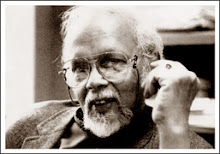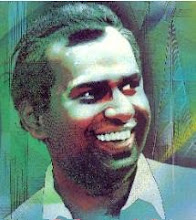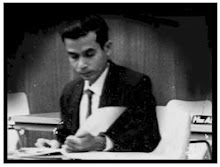Ceylon, still a dominion in the 1960s, witnesses a massive surge in the country's arts scene. It flows throughout every art medium, stage play, literature and painting to name a few. Many playwrights get into the writing business too.
This reaches a climax in the 1970s, with the youth insurgency. It becomes a political flop, though it influences the art in a positive wave. Most of today's veterans and seniors are the offshoot of the 1970s. Bandula Vithanage belongs to that crowd.
Even at Colombo University Bandula does not hesitate to join Professor Ediriweera Sarachchandra's university drama circle. His performance as Vidushaka in Rathnavali production won much praise from the intellectual crowd.
| |
Although he chose Sinhala for his A/Ls he had his primary education in English. He had a wide exposure to the English literature; Shakespeare attracted him the most. Little did he know Shakespeare would change his life and career, by then.
He initiates his journey on the stage by translating Harold Pinter's 'The Collection', and Jean Anouilh's Becket. Bandula takes a massive step in 1980 to translate 'Merchant of Venice' and 'Twelfth Night' (co-produced by Tony Ranasinghe, who did a brilliant performance as Shylock). He has translated 'Hamlet' and 'Comedy of Errors' to this day. Several productions followed on.
"Shakespeare is of course lovely read once you get used to his language style. Of all his works, I think it's 'Macbeth' which is the best."
Though it was 'Hamlet' sometime ago, Bandula has reasons to state so.
"Brevity and suspense brought out step by step makes 'Macbeth' number one in the Shakespeare collection. There are interpolations here and there. But a close scrutiny gives evidence it belongs to Shakespeare."
Unlike most of other Shakespearean works, Macbeth's protagonist himself is a villain, who drives through to the crown killing every obstacle that stands in his way. With all his characteristics Macbeth can be compared with Richard III.
"Inspiration of translating all these Shakespearean works came to me in 1998. I have already done a translation of 'Macbeth' even before, but this is a modified translation. I need to release both 'Hamlet' and 'Macbeth' as two separate translations," he noted.
Vithanage has provided a detailed introduction to his translation of 'Macbeth', which will be released shortly. "Whenever I go to America or any other country I make it a habit to buy whatever publication that has to do with Shakespeare."
Out of all his contemporaries like Christopher Marlowe, Shakespeare could steal the show, because he was a genius, Vithanage says. He could pen down 37 plays and he is considered the national poet in England. His period is considered the golden era of London.
"Shakespeare has magic in his language. Shakespeare himself coined a lot of terms apart from the standard ones. Even the English find it difficult to read these at times." Sometimes even Shakespeare has stolen phrases and sources. Nearly all his plays have a source, out of which he deconstructed and manipulated the plot. For instance Hamlet is taken from a Spanish tragedy. Even the name rings familiar Spanish lineage.
"I fervently believe Shakespeare can influence the Sinhala theatre. In fact, he has already influenced our theatre. Even during John de Silva's time most of the Shakespearean works, especially 'Merchant of Venice' had been staged."
Of all the plays, Bandula had a warm response for his translation of 'Merchant of Venice'. Both 'Merchant of Venice' and 'Romeo and Juliet' have equal attraction in local culture.
Sri Lankan awareness of Shakespeare is now becoming better.
"You should read Shakespeare if you need to learn thorough grammar but our people hardly read more translations than the originals." When it comes to local theatre artistes, Bandula Vithanage has slightly a different opinion.
"We have good theatre artistes like Buddhika Damayantha but they seem to target one specific goal. Once they get an award, they seem to pull out. We have no proper way of organizing the theatre. We have lots of difficulties and hardships organizing the plays. People will often go for low comedies."
Things have turned for the better following the war, he adds. People have a fear-free mind to evaluate one from another.
*********
Stage plays
1969 Megha Garjana
1971 Gangavak Sapattu Kabalak saha Maranayak
1974 Beckett
1980 Venisiye Velenda
1982 Dolosveni Rathriya (co-produced with Tony Ranasinghe)
1986 Senehebara Dolly
1990 Hiru Dahasa
1996 Romaya Gini Gani
1998 Sikuru Senakeli
2001 Macbeth
2002 Eliya
2003 A Sonduru Minisa
Teledramas
Atta Bindei
Bumu Thurunu
Asal Vesiyo
Yahaluwo
Malaya
Punchi Kumarihami
Puthu Senehasa
In print form
1989 Senehabara Dolly
1995 Hiru Dahasa
1995 Venisiye Velenda
1997 Romaya Gini Gani
1998 Hamlet
1999 Sikuru Senakeli
2000 Hamlet Sandeepani
Awards
1987 State Drama Festival Best Translation production Senehebara Dolly
1990 State Drama Festival Best Translation production Hiru Dahasa
1997 State Drama Festival Best Direction and Adaptation Romaya Gini Gani
*********
Bandula's stage: a bird's eye view
Megha Garjana
Vithanage starts his career on the stage by producing Harold Pinter's 'The Collection' into Sinhala Megha Garjana. This was in 1969. Pinter's way of expression, short dialogues and simple dialect, impresses Bandula. He was set to introduce it to the local audience. Its original cast included Wickrama Bogoda, Nirmani Kiriella, Piyasena Ahangama and Lal Liyanaarachchi.
Gangavak, Sapattu Kabalak saha Maranayak
"... Vithanage had a difficult task to maintain audience interest... that he succeeded is not only a tribute to actors but also to Vithanage's planning of the stage business, sparse décor and lighting." - Arts Magazine C. B. C.
Vithanage produced the visual poem composed by Simon Navagattegama in 1970. Saman Bokalawela and Prema Ganegoda gave a prominent contribution.
Beckett
In 1974 Vithanage translated Jean Anouilh's Becket. The cast included Lucian Bulathsinhala, Dharmasiri Bandaranaika, Somalatha Subasinghe and Indra Ramanayaka. "I have already watched and read the original play by then. Most of the scenes were inscribed in my mind. I saw an English production of Becket in England at a later date, and I didn't see a much difference." Bandula recalls.
Veniciye Velenda
"I made it a habit to read an important play-script whenever I get a chance. Tony Ranasinghe once saw me reading 'Merchant of Venice' and expressed his willingness to take part if I would translate it for the stage. This was quite an inspiration for me. Tony came to the stage once again after 13 years in this production."
Senehebara Dolly
Vithanage translates and produces Thornton Wilder's 'Match Maker' in 1986.
"Thornton Wilder doesn't try to portray the nature in an extraordinary way. He just creates that scene flow. He didn't believe much in being materialistic on the stage too. That appealed to me a lot," says Bandula.
Hiru Dahasa
Vithanage goes on to translate another Wilder work in 1990: 'Our Town', which won much accolades. The play is popular actress Yasodha Wimaladharma's maiden performance on the stage and she clinched the best actress award. Bandula won the award for the best translation and direction.
"Wilder follows a very simple style in writing this. He wrote about his own American culture in a very simple way. He was skilful enough to make it universal."
Romaya Gini Gani
The translation of 'Run For your Wife' by Ray Cooney in 1996. Late veteran dramatist Bandula Jayawardana penned down his ideas about the play to Daily News.
"The play is undiluted fun and merriment with no pretensions to profundity, wholesomely free from the bitterness of satire and on the other side, from buffoonery and clowning, all the same the goings on reminding us what fools we mortals be. In this process of innocent human frailties, the masculine ones in particular, are revealed without effort."
Source: Abhinaya, Volume IX. 70 Dashakaye Natyakaruvo





































No comments:
Post a Comment